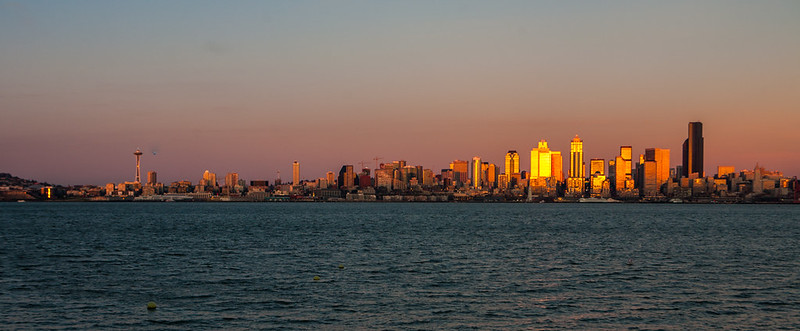The Seattle skyline over the Puget Sound as seen from West Seattle (Credit: Kristie McLean via Flickr)
The NRDC Action Fund is driving climate action in cities across the country through the Bloomberg Philanthropies American Cities Climate Challenge. This post is written by Elizabeth Stampe.
In one of the nation’s fastest-growing cities, large new buildings could continue to be powered by fossil fuels—or they could cut carbon emissions and clean up the air as exemplars of a clean energy future.
Seattle’s City Council will soon have the opportunity to make this transformation with an update to the city’s building energy code. You can help: take action now.
Energy codes matter
Energy codes can seem technical, but they are a key tool to reduce emissions, employed by fellow Climate Challenge cities from San Jose to Honolulu. The codes guide how newly constructed buildings use energy, with technical guidelines for space heating, water heating, windows, walls, lighting, and more.
The energy used in buildings is a major source of carbon emissions in Seattle, and three-quarters of those emissions come from fossil (aka “natural”) gas. In Seattle, with many more new buildings going up using gas, and more heating and cooling needed in an already-changing climate, this source of pollution is growing rapidly.
Seattle’s proposed building code update has the potential to avoid a 12 percent increase in the sector’s climate pollution by 2050. It can also prevent the future growth of this pollution as more buildings are constructed and operate for decades to come.
Building better from the start
The proposed code would address commercial and large multifamily buildings (apartments and condos) in three ways:
- Save energy first. When it comes to energy efficiency, walls, roofs, and windows matter most. The code requires building exteriors that minimize air leakage and heat loss, as well as high-efficiency lighting. These create more comfortable indoor spaces, reduce wasted energy, and reduce the costs of monthly utility bills.
- Prioritize clean energy from electricity and eliminate most uses of fossil fuel. Fossil fuels like oil and fracked gas are harmful to health and the environment. Although gas stoves are allowed, the new code creates a path to phase them out along with polluting appliances like furnaces and hot water heaters and take advantage of Seattle’s carbon-neutral electricity. The code requires electric space heating and water heating as well as electric-ready wiring, so that developers install the electrical infrastructure needed for future conversion of gas appliances.
- Make it easy to harness the power of the sun. The code specifies that buildings must be solar-ready, enabling easy future installation of solar panels, making clean, affordable power more accessible to more people. Solar-readiness also avoids the costs of having to retrofit in the future.
Support across the city and beyond
Many advocates, including Shift Zero, NW Energy Coalition, Washington Physicians for Social Responsibility, and Sierra Club Washington State Chapter are strong supporters of the new code and have worked hard to support its passage.
The prominent labor group MLK Labor Council, which represents more than 150 unions and 100,000 workers, also sees the new code as an opportunity.
“Thoughtful steps like those proposed to the Seattle energy code are the kinds of changes our society must make to mitigate climate change and protect workers,” said Nicole Grant, executive secretary treasurer of MLK Labor, in a recent press release.
Affordable housing developers are also working with the City and Emerald Cities Collaborative, a local partner through the Climate Challenge, to think through technical considerations and meet overlapping needs.
“We are battling concurrent crises of climate, equity, and housing during an unprecedented pandemic,” added Marty Kooistra, executive director of Housing Development Consortium, in the same release. “We must not relent in our pursuit to reverse the damage to our planet.”
This work is also translating to state proposals, including one from Governor Inslee for the upcoming legislative session, to eliminate all fossil fuels from new construction by 2030 and from existing buildings by 2050.
Take action to support a strong code
Seattle is a leader, and the City Council’s passage of this code will inspire others. Many cities are seeking to get fossil fuels out of buildings, while encouraging affordable housing and a just transition to a clean energy future for local workers.
You can help Seattle take this crucial step forward.
Contact your City Councilmember to urge them to pass a strong energy code, starting 2021 right for the climate and the people of Seattle, and showing the way for cities nationwide.

